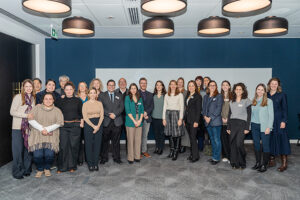As the newly appointed Co-Chair of The Consumer Goods Forum’s (CGF) Food Waste Coalition of Action, Annabelle Souchon, Group CRS Manager at Bel Group, is bringing her passion and expertise to the forefront of the fight against food waste. In this interview, she shares how Bel Group has embedded sustainability into its core strategy, the biggest challenges in tackling food waste, and how collaboration across the value chain can drive lasting impact. From innovative product design to consumer engagement campaigns, Annabelle discusses the Coalition’s key priorities for 2025 and her vision for a future where food waste is no longer an accepted norm.

Thank you! Food waste has always been a deeply personal and professional priority for me. At Bel Group, reducing food waste has been part of our history since the creation of single-serving portions of The Laughing Cow® a century ago—an innovation originally designed to valorize cheese surplus. As Co-Chair, I’m excited to bring this passion and our expertise to the Coalition. I believe our experience in initiatives like the 10x20x30 campaign, where we committed to halving food waste by 2030, positions us to inspire meaningful collaboration and innovation across the industry. Together, we can accelerate progress toward a future where food waste is no longer an accepted norm.
Bel Group has been a trailblazer in sustainability. Can you share one or two standout initiatives or innovations that have made a measurable impact in reducing food waste across your operations?
At Bel Group, we’ve made it our mission to offer healthier and more responsible food for all—a commitment so important that it’s written into our company by-laws. Our signature portion format offers the right nutritional intake to promote healthier lifestyles, and it is also a key asset to reduce food waste and thus support our efforts to align with the 1.5°C climate trajectory under our “BeLowCarbon” plan, validated by the Science-Based Target initiative. Food waste accounts for 4% of our total carbon footprint, equivalent to the emissions from all Bel plants combined, so tackling this issue is critical.
One key initiative is our process of repurposing by-products into other recipes. For example, we use cream, a by-product of hard cheese production, in our Kiri products and incorporate Babybel with aesthetic imperfections into our The Laughing Cow recipes. This approach ensures we maximize the use of raw materials. Additionally, our single-serving formats continue to play a pivotal role in reducing waste by offering consumers the right portion size, enabling better preservation, and minimizing leftovers. These efforts are complemented by campaigns like #TooGoodToWaste, which educate consumers about food waste, and partnerships such as “Look, Smell, Taste” with Too Good To Go, encouraging smarter consumption habits. By combining innovation, collaboration, and education, we’re reducing waste and creating meaningful impact for both the planet and our communities.
Food waste is a complex global challenge. What do you see as the most pressing barriers to addressing it effectively, and how can the Coalition help overcome these obstacles?
One of the biggest barriers is the lack of alignment across the value chain, which leads to inefficiencies and missed opportunities. For example, much of the carbon impact of food waste stems from upstream processes like raw material production. At Bel Group, we’ve tackled this by sourcing milk locally and valorizing surplus, minimizing the waste of resources. Another challenge is educating citizens —households account for a significant portion of food waste, often due to confusion over expiration dates. The Coalition can play a pivotal role by uniting stakeholders to share best practices, develop joint campaigns like #TooGoodToWaste and drive systemic change.
You’ve previously co-chaired the Coalition’s working group on consumer engagement. How do you think engaging consumers can play a pivotal role in reducing food waste, and what lessons from that experience will you bring to your new role as Co-Chair?
Consumer behavior is critical in the fight against food waste. Households are responsible for about 1/3 of all food loss & waste, and helping them adopt more sustainable habits can make a significant impact. During my time co-chairing the consumer engagement working group, I saw firsthand how initiatives like our #TooGoodToWaste campaign can effectively educate and empower people. At Bel, the campaign was promoted across six brands in 15 countries, leveraging the communication power of our brands to drive meaningful change. We also partnered with Too Good To Go to clarify date labelling, encouraging consumers to “Look, Smell, Taste” before discarding products. As Co-Chair, I’ll ensure consumer engagement remains central to our strategy , continuously seeking innovative ways to inspire and support sustainable practices among our consumers.

My top priority is scaling the Coalition’s impact, particularly by fostering collaboration across the value chain. In 2025, I’m eager to advance initiatives like facilitating food waste reporting to identify hotspots and supporting consumer education campaigns. Partnerships will also be key—whether it’s working with all food players to redistribute surplus food or leveraging the communication power of our members to change consumption habits. Additionally, we’ll continue to push for ambitious climate action, aligning with the Coalition’s goals to halve food waste and drive measurable reductions in greenhouse gas emissions.
Looking to the future, what does success look like to you for the Food Waste Coalition of Action? How do you think we can inspire more organizations and manufacturers to join the fight against food waste?
Success means creating a food system where waste is minimized and the resources used to produce food are respected. For the Coalition, this means achieving measurable progress, like halving food waste by 2030, and ensuring our initiatives contribute to meaningful reductions in global greenhouse gas emissions. To inspire more organizations, we must showcase tangible results. Sharing stories of impactful collaborations, like our work with Too Good To Go, can demonstrate the benefits of collective action and encourage others to join this critical mission.
For more information on how CGF’s Food Waste Coalition is uniting businesses to combat food loss and waste, visit www.tcgffoodwaste.com.
